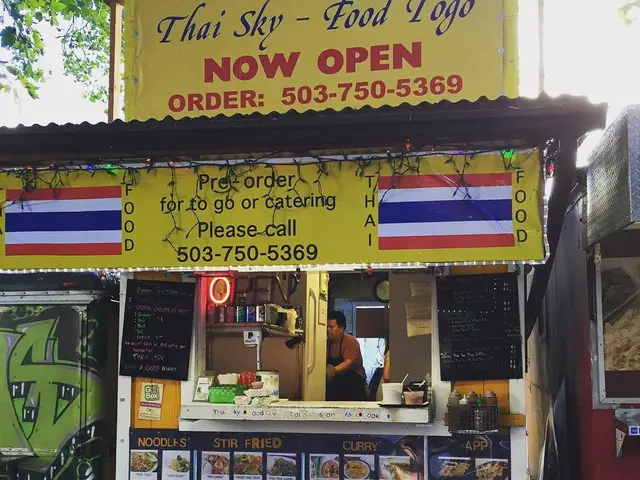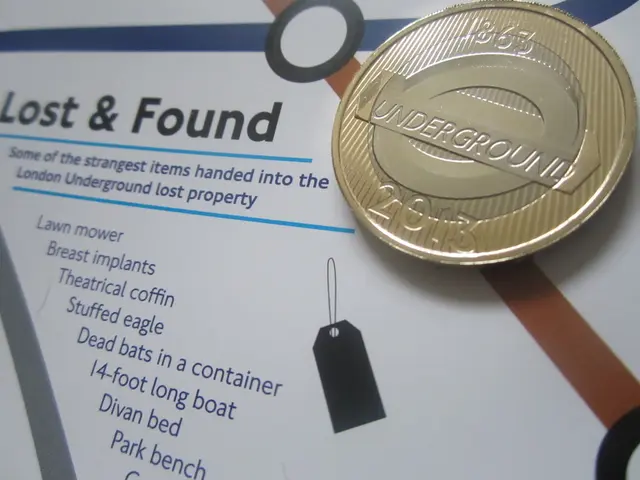Food Delivery Giants Squashed by EU: Delivery Hero and Glovo Fined €329 Million for Illegal Cartel
- *
Delivery Hero Faces Hefty €223 Million Penalty for Cartel Misdeeds - Unlawful Cartel Imposes Penalty: Delivery Hero Fined 223 Million for Transgressions
The Berlin-based food delivery service Delivery Hero and Spain's Glovo have found themselves in hot water after the European Union (EU) Commission dished out a combined €329 million fine. The whopping penalty was a result of the two companies colluding in illegal cartel activities.
Delivery Hero and Glovo have been slapped with fines amounting to €223 million and €106 million, respectively. The EU Commission, residing in Brussels, levied the punishment due to anti-competitive deals, including price and strategy agreements, as revealed at a press conference.
According to the investigation, these companies went beyond just working together on market strategies. They allegedly agreed not to poach employees and divvied up local markets, all of which were communicated through emails and WhatsApp messages.
EU Commissioner Aiming for Fair Labor Market
Teresa Ribera, EU Commissioner, took the opportunity to remind companies that this is the first time they have been penalized for such employee agreements. She emphasized the significance of establishing a fair labor market where employers don't collude to limit opportunities.
The Commission elected not to comment on the direct impact on consumers or rivals in Germany. However, an official noted that Delivery Hero actively operates in the German market while Glovo does not.
Collusion dates back to the past
The series of events leading to this situation materialized over a significant period. In November 2023, the Commission initiated unannounced inspections at Delivery Hero's headquarters in Berlin and Glovo's headquarters in Barcelona. Delivery Hero acknowledged its cooperation with the Commission throughout the probe.
Delivery Hero originally acquired a minority stake in Glovo in 2018, becoming the full proprietor in 2022. The EU Commission highlighted that the agreements took place prior to the takeover, with both companies conceding their membership in the cartel.
Delivery Hero braced for a larger fine
In 2022, Delivery Hero gave a heads up about a possible fine of more than €400 million due to the cartel. Up until then, the Berlin-based company had set aside €186 million to address the issue.
Surprisingly, the final fine turned out to be approximately 20% lower than anticipated, amounting to roughly €329 million. This decrease is due to the Commission acknowledging that the objectionable behavior occurred less frequently during particular time periods.
Both Delivery Hero and Glovo rank as two of the most extensive food delivery services across Europe, catering to more than just meals.
- Delivery Hero
- Breaking Market Rules
- Berlin
- Brussels
- Cartel
- EU
- EU Commission
- Headquarters
- Labor market
- Undercut Competition
- Spain
- Teresa Ribera
Insight into the Scandal
The fine stems from a longstanding cartel between Delivery Hero and Glovo in the online food delivery market. That said, the EU Commission's investigation traced the collusion back to their unannounced inspections in June 2022 and November 2023. The trigger for the probe was rooted in whistleblower reports, national competition authority tips, and broader market monitoring efforts.
The companies aligned their business strategies over a four-year period (2018–2022), swapping market rivalry for coordinated tactics. Confidential commercial data regarding pricing, sales strategies, and product developments was exchanged between the two parties. Additionally, the Commission found evidence of market segmentation, as both entities avoided entering each other's markets within the European Economic Area (EEA).
This case serves as a landmark event for the European Commission, marking the first time it has penalized a 'no-poach' agreement and a cartel facilitated by minority investments in the tech-enabled labor market. The fine highlights a stronger focus on digital platforms operating within Europe, with the Commission emphasizing the need to uphold antitrust rules that ensure competitive labor markets and protect consumer interests.
Moreover, the ruling brings to light an essential perspective on employee and labor issues, especially considering Glovo's contentious employment model and prior labor law challenges. The 'no-poach' agreements demonstrated how such collusion among employers could restrict job opportunities and depress wages. The fines, public findings, and increased scrutiny have dealt a severe financial and reputational blow to both companies, foreshadowing stricter oversight for digital platforms in Europe.
| Aspect | Details ||-----------------------|-------------------------------------------------------------------------------------------|| Period | July 2018 – July 2022 || Total Fine | €329 million (Delivery Hero: €223 million, Glovo: €106 million) || Evidence | WhatsApp, emails, luxury chalet meetings, confidential data exchanges || Key Agreements | No entry into each other’s markets, no-poach agreements, sharing sensitive information || Acquisition | Delivery Hero acquired Glovo (from July 2018 to July 2022) || Legislation | Article 101 TFEU, Article 53 EEA Agreement || Investigative Methods | Unannounced inspections (June 2022, Nov 2023), whistleblower reports, national tips || Market Consequences | Reduced competition, limited worker opportunities, consumer choice and price protection |
This case underscores the EU's commitment to maintaining a competitive, fair digital marketplace and sheds light on new enforcement priorities, particularly with regards to digital platforms and labor market practices in the tech industry.
- The EU Commission fined Delivery Hero and Glovo €223 million and €106 million, respectively, for illegal cartel activities in the food delivery industry, including price and strategy agreements, no-poach agreements, and market segmentation.
- Teresa Ribera, EU Commissioner, emphasized the importance of a fair labor market where employers don't collude to limit opportunities, stating that this is the first time such employee agreements have been penalized in the tech industry.








